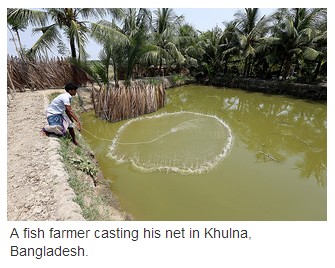New report links aquaculture and poverty reduction
Published: August 15, 2014
By: Worldfish
WorldFish working together with the Bangladesh Institute of Development Studies has exposed evidence of aquaculture's link to poverty reduction in a new report. Data gathered over a ten-year period provides important evidence for the need to invest in the sector as a way to alleviate global poverty and hunger.
By analyzing changes in fish consumption in Bangladesh between 2000 and 2010, the report proves conclusively that growth in aquaculture has led to greater fish consumption among the poorest consumers in Bangladesh. While it had previously been considered that the benefits of the growth in aquaculture were derived mainly from increased employment, the study demonstrates a stronger link to the health benefits of eating more fish.
The peer-reviewed paper published in the academic journal World Development provides proof of the long suspected link between aquaculture and poverty reduction for the first time. However the paper also underlines the importance of capture fisheries, which are in sharp decline, and the need to promote an enabling environment for both sectors.

Stephen Hall, Director General, WorldFish: “Sustainable aquaculture has long been acknowledged as an important tool in the fight against global hunger. As evidence consistently proves this point, there will be greater incentive for investment in the sector while at the same time supporting the development of sustainable wild capture fisheries.”
Is Aquaculture Pro-Poor? Empirical Evidence of Impacts on Fish Consumption in Bangladesh co-authored by Kazi Ali Toufique of the Bangladesh Institute of Development Studies and Ben Belton of WorldFish also observes that while aquaculture has reduced prices and increased availability of fish, wild capture fish supply has diminished. Given that more than 70 percent of rural households rely to some extent on wild capture, this is an important factor. If it had been possible to slow the decline in capture fisheries in parallel to increased aquaculture production, the authors say, the pro-poor impact would have been more pronounced. While increases in aquaculture production have been sufficient to offset any loss, they conclude that policies are needed that support both sectors in parallel.
Is Aquaculture Pro-Poor? Empirical Evidence of Impacts on Fish Consumption in Bangladesh is a contribution to the CGIAR Research Programs (CRPs) on Aquatic Agricultural Systems and Livestock and Fish in which WorldFish participates as well as an output of the GIZ funded project Aquaculture and the Poor: Improving fish production, consumption and nutrition linkages.
Source
WorldfishRelated topics:
Recommend
Comment
Share

Would you like to discuss another topic? Create a new post to engage with experts in the community.



